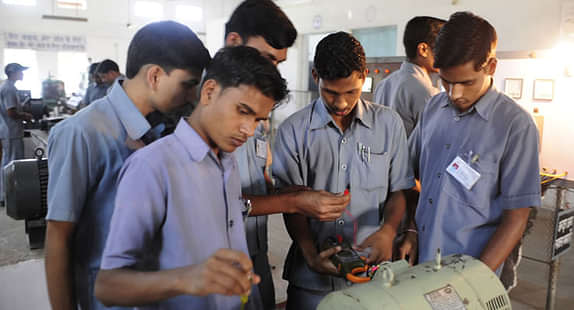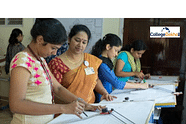What if somebody told you that your choice of course after 12th is seriously hampering your chances of earning a good salary? In fact, what if we told you that in doing so, you may actually be earning half of what you can in the same amount of time? Read on for more information.

Comparing a Master of Business Administration (MBA) degree to any vocational course may seem like a weird thing to do. However, doing so helps illustrate a trend that has implanted itself in the mind of an average Indian student. This trend is the silent force acting behind many students in India taking up programmes that they may not even be interested in, even programmes that they may not have the required skill-set and aptitude for. Students ignore instead the courses that they may not only excel academically in but also get much higher returns, in terms of a better salary and growth, in their future.
We are talking about the trend of having and fighting tooth-and-nail for a 'white-collar job'.
In this article, our aim is not to criticize the choice of course of any student but merely to touch upon an alternative route that any student in India is free to take when choosing a programme and, along with it, a career. If nothing else, this article aims to persuade a student to think about the job, scope and the salary that they can expect to get before they take up a course, a way of thinking that is often found lacking in an average Indian student when he decides on the mode and course of higher education.
Now that we are done explaining why we have compared an MBA with vocational courses, let's come to the actual topic at hand.
MBA vs Vocational Courses: The Basics
MBA and vocational courses are worlds apart. The two are vastly different not only in the academic terms (i.e. their curriculums, scope, jobs, colleges etc.) but they also attract different categories of students with different career paths in mind. However, when we focus on the one thing that unites both courses i.e. the wish of a student to get a good salary after completing of a course, we see a trend that is detached from what is generally perceived to be the truth. But first, let's get the basics out of the way.
What is an MBA?
Also offered as PGDM courses , an MBA programme trains and sharpens the management skills of a student. With a focus on subjects such as Marketing, Human Resource Management, Project Management etc., an MBA graduate is trained and educated to come up with and properly execute strategies for growth and better management of resources in their respective disciplines.
Hence, MBA graduates are in-demand and MBA is one of the most coveted degrees in India as well as around the world. There a couple of good reasons why.
- The versatility of MBA specializations make them suitable for graduates from a wide variety of disciplines
- MBA graduates are some of the most well-paid professionals in the world. Just check this list of MBA colleges that offer a chance at some of the best salary packages in India .
- There are more than 4,000 MBA colleges in India and the availability of distance MBA programmes in India has also enabled working professionals to go for an MBA degree and improve their prospects of career growth in their respective industries.
- MBA is also one of the top postgraduation course choices of engineering graduates in India .
MBA Eligibility Criteria
Generally, candidates who have completed a 3 or 4-year bachelor's degree programme in any discipline are eligible for admission to an MBA college in India. Colleges also require a candidate to have certain minimum percentage marks (usually set at 50%) to be eligible to apply. Candidates are also required to take one of the MBA entrance exams in India , as may be required by the college.
What are Vocational Courses?
Vocational or Professional courses have a different approach to education than academic-oriented courses such as MBA. Vocational courses instead are designed to sharpen the practical skills of a student and have a hands-on approach towards education. Vocational courses in India can be more versatile in terms of adapting to market demand and satisfy a wide range of market niches.
Vocational courses are offered in a wide variety of disciplines ranging from Photography to Animation, Textile Design, Gemology, ITI courses etc. There is no shortage of vocational colleges in India and their programmes offer excellent prospects at getting a job soon after a student graduates.
Vocational Courses Eligibility Criteria
Since vocational courses are not only available in a multitude of specializations but also at multiple levels ranging from Certificate programmes to Diploma and even undergraduate courses, general eligibility criteria cannot be provided for all of the courses.
Admission to vocational courses can be taken at multiple levels of education. There are vocational courses available after 10th and several professional programmes can also be taken up after class 12th. Besides that, most vocational courses do not have any requirement for an entrance exam and admissions are mostly merit-based.
Why go for a Vocational Course in India?
A recent survey conducted by one of the top news agencies of India has brought to light some surprising results. In the survey, it was found out that while an average MBA graduate in India earned a salary of Rs. 40,000 per month after gaining five years of experience, a graduate of a vocational course with the same amount of experience was earning about Rs. 60,000 per month on an average.
While the results of this survey are surprising on their own, this difference becomes even more exaggerated when we consider some other factors along with this result.
Consider that:
- A student spends around Rs. 8 lakhs to Rs. 14 lakhs to complete an MBA programme from a Tier-3 or Tier-4 B-school in India but a vocational course rarely costs over Rs. 1 lakh.
- While a student spends 4 to 6 years of time studying to become an MBA graduate, most vocational courses can be completed in 1 year and 6-month professional courses are also quite popular.
- Admission to the top-tier MBA colleges is highly competitive and even the admission process can often prove to be quite expensive. However, vocational colleges can be comparatively much easier to get into and afford.
The survey has helped it become quite apparent that the return-over-investment ratio of an MBA programme in India can often be found to be quite low and many MBA graduates fail to land the jobs and packages using which MBA programmes are often advertised by various colleges. And the news-worthy packages that cross the 50 lakh or even 1-crore mark are very rare and most offered to exceptional students who find admissions to the IIMs in India and many other B-Schools that are considered to uphold similar levels of academic excellence.
Most of the MBA graduates in India are employed at surprisingly low-paying jobs and a large chunk of the students even fail to land a job for a couple of years after completing their programme. Even graduates of engineering disciplines (a much more expensive course than vocational courses) are only able to gain comparative or marginally higher salaries in the current scenario.
On the other hand, a large population of students is ignoring the courses that can help them start earning higher and much more quickly than many other traditional higher education courses such as MBA and engineering, and all because of the attraction of keeping a white-collar job as well as peer pressure from parents as well as society.
Because of this, the vocational job sector is seeing a shortage in supply of trained professionals and the demand is rising every year. Students who have completed vocational courses are finding it easier than ever to get good jobs that pay well. Even in the upcoming decade, the vocational job market is expected to see a deficit of more than 50 million people and the salaries that students graduating from these courses can earn are only expected to go higher.
So, while it is for you to decide your career pathway, do not only consider and follow a trend just because everyone else is doing it. It is important to introspect about your courses, do some research on the course that match your interests and consider the overall aspects of completing the programme, including how much return can you expect from it and what is the expected trend for that course.
CollegeDekho will keep bringing you the latest updates regarding admissions in India to help you stay on top of the game. Stay tuned!
Are you feeling lost and unsure about what career path to take after completing 12th standard?
Say goodbye to confusion and hello to a bright future!

Was this article helpful?


















Similar Articles
List of 21 Fake Universities in India 2025 by UGC (New List)
Assam Class 11 Registration Form 2026 - Check Assam Class 11 Registration Form Dates, Fees
REET 2025: Result (Out), Answer Key (Out), Question Papers (Out), Cutoff, Selection Process, Vacancy
Police Ranks In India: Complete Rank-wise Post List with Salary & Badges
AP ICET 2025 Application Form Correction (Closed) - Direct Link (Closed), Dates, Categories, Detailed Instructions
Bhim Rao Ambedkar College CUET UG Cutoff 2025: Expected Cutoff based on Previous Trends